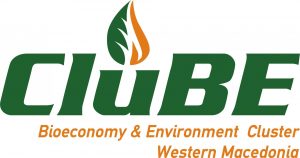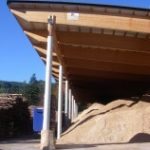17 Ιούν ROSEWOOD4.0, Best Practices and Business Ideas

Objectives
ROSEWOOD4.0 harnesses digital solutions and boosts knowledge transfer to connect multiple actors along the forest value chain to reinforce the sustainability of wood mobilisation in Europe. The project builds on the ROSEWOOD network of regional hubs, and extends it, in order to promote digitalisation and digital tools for knowledge transfer, training and coaching, enabling practitioners to share knowhow with much wider impact. The Cluster of Bioeconomy and Environment of Western Macedonia (CLuBE) is a platform for cooperation of the five pillars of the regional economy: the public sector, research and academia, industry and SME’s, environment and social entrepreneurship. The Cluster seeks to develop synergies between local and regional players and businesses in bioeconomy and the environment, aiming at introducing and developing innovation in the sector and increasing its added value.
South East Europe Hub
In ROSEWOOD4.0, CluBE is a member of the South East Europe Hub (SEE Hub), which covers Croatia, Greece and Slovenia. The Hub’s countries are rich in natural resources, especially forests, with great potential for supplying sustainable wood to Europe’s bio economy. The aim of the South East Europe Hub is to address challenges specific to the regional forestry and wood industry sector. In this process there is close collaboration with the other ROSEWOOD4.0 regions and hubs, in order to transfer knowledge and expertise, in ways that will ultimately strengthen local value chains of forestry and wood industry, adding value in all stages, from the tree in the forest to the final product and end use.
Best Practices and Knowledge Transfer
Improving the sustainability of the wood value chain in Western Macedonia, and in Greece more generally, is a complex task which should take under consideration several important factors. In the framework of ROSEWOOD4.0, CluBE focuses on researching Best Practices in fields such as education, research, innovation management, ICT tools and advisory services. Overall, judging from the outcomes produced by practices already in use, it is obvious that ICT can be a driving force in the process of shaping initiatives in wood mobilization, across the wood value chain.
Although there is skilled workforce, there is also lack of an adequately trained workforce in terms of digital skills. This is linked to the shortage of skilled entrepreneurs, workers in the wood value chain and harvesters. Therefore, Greece should focus on bridging the existing gap in using cutting-edge ICT technologies in the wood mobilization value chain. This requires substantial effort but provides huge amounts of added value. This is probably a major barrier to additional wood mobilisation. The same restriction applies to research projects and transferring knowledge from well tested practices. Therefore, it is important to create and sustain strong institutional capacity (from universities and research centers to public authorities and SMEs), with sufficient human resources towards research and innovation in forestry.
Additionally, we should also seek for innovative measures for applying tested practices that meet high environmental quality and financial viability standards. These should target biomass suppliers, energy producers, and the financial sector, in order to cover thematic fields such as genetics, biodiversity, harvesting technology and socioeconomics.
Beyond any doubt, digital solutions are also very much needed: from monitoring factors such as weather conditions and accessibility, to effective logistics and new marketing policies, ICT is crucial for the wood value chain. Of course, the transition towards an extensive use of these tools by relevant stakeholders has to be smooth. Additionally, we need advisory services that entail building and using new financial tools or providing information pertaining to securing funds for new investments.
Innovation and innovation management could come through novel software tools and possibly integrated ICT solutions involving fields like IoT and AI. Forest digitization with interactive maps and GIS tools is a route we would like to further develop. We encourage the flow of research and technological development information and the exchange of knowledge. For Western Macedonia, this holds especially for new technologies for harvesting woody biomass for energy use.
Business Idea Workshops
The SEE Hub organized two Business Idea Workshops to identify gaps in the Best Practices studied so far and select business cases that are promising and demonstrate strong potential for further development. During the process, SEE’s members identified innovations such as building homes with locally sourced wood (Zero Emission Neighbourhood), the implementation of Biomass Atlases, activities that will help Regional Stakeholders create Biomass Trade Centers, and Digital Forest Management documentation tools.
Promoting the Idea of Biomass Trade Centers in Western Macedonia
The recent establishment of two biomass boilers (2x15MWth each) for the provision of heat to one of the District Heating Newtorks (Municipality of Amynteo) unveiled the fact that the local biomass market is fragmented and unorganized. This is also valid for the whole country, however the increasing demand in Western Macedonia makes it even more important to organize the biomass supply chain and biomass trade centers are a new and innovative way to achieve this. Moreover, Biomass Trade Centers can act as regional hubs with optimized logistics and trading techniques, where various biomass fuels (firewood, chips, pellets, energy crops etc.) are marketed at guaranteed quality, quantity and prices. They link wood supply from forest owners, sawmills and other wood producers with demand from bulk and small buyers. Thus, they can create investments and help in further developing the existing value chains related to wood mobilization. These findings were also discussed in SEE’s Business Idea Workshops, where experts from Greece, Croatia and Slovenia suggested that, under carefully designed implementation steps, this idea is highly likely to form a viable solution for Western Macedonia. Therefore, CluBE is actively promoting the necessity to create Regional Biomass Trade Centers and is constantly seeking for resources towards this end.




Background
- Local biomass market in Greece is fragmented and unorganized.
- Biomass trade centers are a new and innovative way to develop and organise local biomass supply.
- Biomass Trade Centers are regional hubs with optimized logistics and trading techniques, where different biomass fuels (firewood, chips, pellets, energy crops etc.) are marketed at guaranteed quality and prices.
- They link wood supply from forest owners, saw mills and other wood producers with demand from bulk and small buyers.
- The main aim is to boost investments and help in further development of existing value chains related to wood mobilization.
Idea to Implementation (Indicative Steps)
- Carry out workshops, study tours and feasibility studies based on lessons learnt from existing Biomass Trade Centers.
- Prepare a technical proposal supplemented by a thorough market and financial feasibility study.
- Preliminary cost estimation (includes operational costs).
- Research potential funding sources and investors.
- Secure funding.
- Implement regional collective rural marketing channels for wood fuels and energy services.
- Set up regional supply centers for distribution of biomass fuels.
- Guarantee consistent quality standards.
© ROSEWOOD4.0 consortium | www.rosewood-network.eu
This project has received funding from the European Union’s Horizon 2020 research and innovation programme under grant agreement No 862681.30

